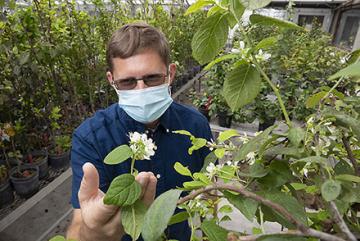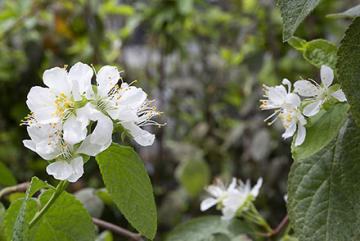ARS Scientists Develop Ever-Flowering Fruit To Feed Astronauts

Chris Dardick, ARS plant molecular biologist, evaluates a continuous flowering plum plant. Stephen Ausmus (D4695-1)
Space travel in the future is expected to last from several months to years, and astronauts will need to maintain healthy diets during those extended voyages.
Scientists with USDA’s Agricultural Research Service (ARS) are working with NASA to develop sustainable farming techniques and technologies to grow fresh produce while in spaceflight. According to Chris Dardick, lead scientist and plant molecular biologist at the ARS Appalachian Fruit Research Station in Kearneysville, WV, there has been promising research on vegetable farming in space because they grow relatively quickly, but fruit…?
According to Dardick, most fruits that are key components of our diet, such as apples, pears, peaches, cherries, grapes, plums, raspberries, oranges, and bananas grow on trees or vines that take years to grow. Many of these fruit trees also require long periods of cold annually to flower and renew their growth.
To get from space farm to fork more quickly, Dardick’s team borrowed an idea from a common backyard garden staple, the tomato.
“We genetically engineered plum trees to continually flower and produce fruit, much like a tomato plant,” he said. “The trees were created by over-expressing a key flowering regulator gene that causes them to flower all of the time and eliminates the need for cold dormancy.”
Not only does this technology offer the potential to grow fruit on long-duration space missions, it could be used on Earth in indoor or urban farms to help feed residents of food deserts – areas where people have limited access to a variety of healthful foods.
This initial investigation was sponsored by the ISS U.S. National Laboratory, which works in coordination with NASA to fully utilize the orbiting laboratory to bring value to our nation through space-based research and technology development. – By Scott Elliott, ARS Office of Communications.
You May Also Like


